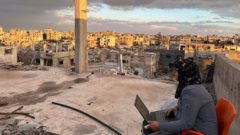How Are Evacuated Gazan Students Starting Their New Lives in the UK?

Published: 2025-09-23 18:40:42 | Category: technology
Last week, a group of 34 Palestinian students successfully evacuated from Gaza to begin their studies at UK universities, marking a significant moment in the ongoing conflict. This is the first instance since the crisis began that students have been allowed to leave Gaza for educational purposes. With the support of the UK government and fully funded scholarships, these students are now enrolling in various institutions across the UK, including London, Edinburgh, Glasgow, and Manchester.
Last updated: 27 October 2023 (BST)
Key Takeaways
- A group of 34 Palestinian students have arrived in the UK to pursue their studies following evacuation from Gaza.
- The students hold fully funded scholarships, including the prestigious Chevening Scholarship programme.
- Efforts are ongoing to evacuate an additional 40 eligible students from Gaza.
- Government rules have prevented some students from bringing their families, leading to difficult decisions.
- The conflict in Gaza has severely impacted education, with many unable to access schooling.
Background of the Evacuations
The recent evacuations of students from Gaza come amid escalating violence in the region. Since the conflict reignited on 7 October 2023, following an attack by Hamas militants, educational access has been severely disrupted. More than 65,000 fatalities in Gaza have been reported since the escalation, according to the territory’s health ministry.
In this fraught environment, the UK government has taken steps to assist these students, who have shown remarkable resilience despite overwhelming circumstances. The evacuation is seen as a lifeline for those pursuing higher education, allowing them to fulfil their academic ambitions away from the turmoil.
Challenges Faced by Evacuated Students
While the students are starting anew in the UK, the emotional toll of leaving their families and homes behind is significant. Dr. Nora Parr, a researcher at the University of Birmingham assisting the students, noted that they are embarking on a difficult journey of adjustment. The stark contrast between their academic dreams and the harsh realities faced by their families in Gaza weighs heavily on them.
One student described their experience as "very intense," reflecting the emotional turbulence of transitioning from a war zone to a new academic environment. As they begin their studies, many are still processing the trauma of their recent experiences.
Government Support and Scholarship Programmes
All 34 students hold scholarships that cover their tuition and living expenses, with many benefiting from the Chevening Scholarship programme, which is aimed at fostering international educational exchange. This initiative illustrates the UK government's commitment to supporting students from conflict zones, providing them with opportunities to continue their education.
In addition to scholarships, the UK government has facilitated the students' travel, ensuring they can settle into their new lives. However, the criteria for evacuation and the inability for some students to bring family members has sparked criticism and concern.
Family Separation and Emotional Impact
The government has faced backlash for policies that prevent students from Gaza from bringing their families with them. Several students, including Manar al-Houbi, a prospective PhD student at the University of Glasgow, have expressed deep distress at the thought of leaving their families behind. Al-Houbi's case highlights the emotional strain many students are experiencing, as they grapple with the decision to pursue their studies while their loved ones remain in a conflict zone.
Dr. Parr mentioned that at least four parents have declined places out of fear of leaving their children in Gaza, reflecting the difficult choices families face amid ongoing violence. The UK government has stated its intention to support students without inflicting further hardship, and discussions continue regarding potential adjustments to policies affecting family reunification.
Academic and Social Integration in the UK
As the students settle into their new surroundings, they are beginning to enrol in courses and integrate into university life. Some have started classes within hours of their arrival, demonstrating their commitment to their education. Institutions across the UK are preparing to offer support, not only academically but also socially, to help these students adjust after their harrowing experiences.
Caoimhe Archibald, the economy minister for Northern Ireland, emphasised the importance of providing a warm welcome and support for the students, considering their traumatic backgrounds. This sentiment is echoed across UK universities, as faculties and staff aim to ensure a nurturing environment for the new arrivals.
Future Evacuations and the Ongoing Situation
The arrival of the initial group of 34 students has raised hopes for the evacuation of nearly 40 more students who are believed to be eligible for the next round of departures. Dr. Parr and other advocates continue to call for the government to facilitate these students' journeys, as education remains a crucial avenue for personal and communal resilience amidst ongoing conflict.
While the UK government has taken significant steps to support these students, the situation remains fluid, and further measures may be needed to ensure that all eligible students can pursue their educational aspirations without further hindrances. The urgency of this matter is compounded by the deteriorating conditions in Gaza, which threaten the future of countless young individuals hoping to obtain an education.
Conclusion: The Importance of Education Amidst Adversity
The arrival of these Palestinian students in the UK highlights the broader challenges faced by individuals in conflict zones seeking educational opportunities. Their stories are a testament to resilience, embodying the spirit of perseverance in the face of adversity. As they begin their studies, they carry not only their hopes and dreams but also the weight of their families' struggles in Gaza.
Moving forward, it is vital for policymakers, educational institutions, and communities to support these students as they rebuild their lives and pursue their studies. Their success will not only benefit them individually but also contribute to a broader narrative of hope and recovery for a generation affected by conflict.
In a world where education can be a transformative force, how can we further ensure that students from conflict-affected areas receive the support they need to succeed? #PalestinianStudents #EducationForAll #UKSupport
FAQs
What scholarships are available for Palestinian students in the UK?
Palestinian students can apply for various scholarships, including the Chevening Scholarship programme, which offers funding for one-year master's degrees at UK universities.
How did the students arrive in the UK after leaving Gaza?
The students were evacuated to Jordan for visa checks before travelling to the UK with the assistance of the UK government, which facilitated their journey after weeks of uncertainty.
What challenges do these students face in adapting to life in the UK?
Students face emotional challenges related to separation from their families and adjusting to a new academic environment, along with the trauma of their experiences in Gaza.
What is the UK government's stance on family reunification for these students?
The UK government has faced criticism for rules preventing students from bringing their families, which has led some students to decline places due to their familial responsibilities in Gaza.
What support is available for Palestinian students studying in the UK?
UK universities are prepared to offer academic and social support, aimed at helping students adjust to their new environment and cope with the challenges they face.



